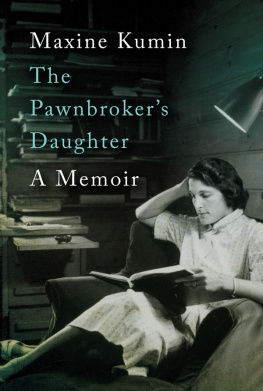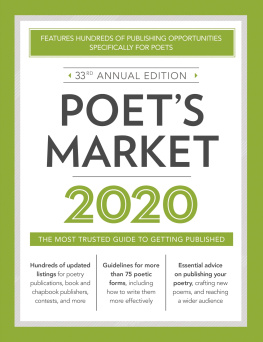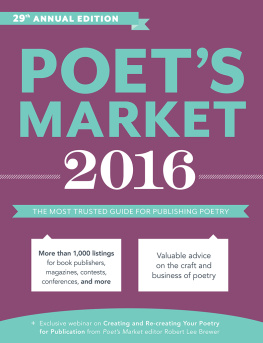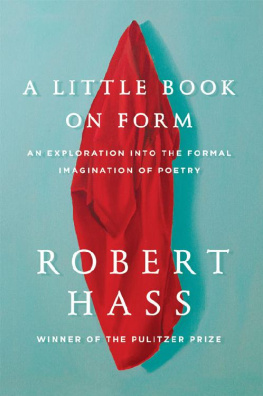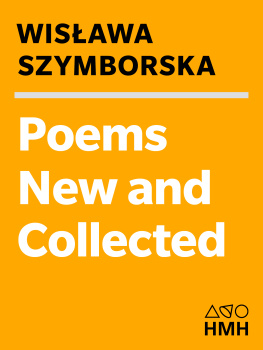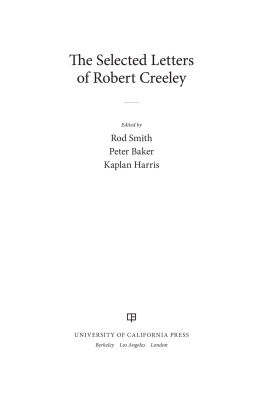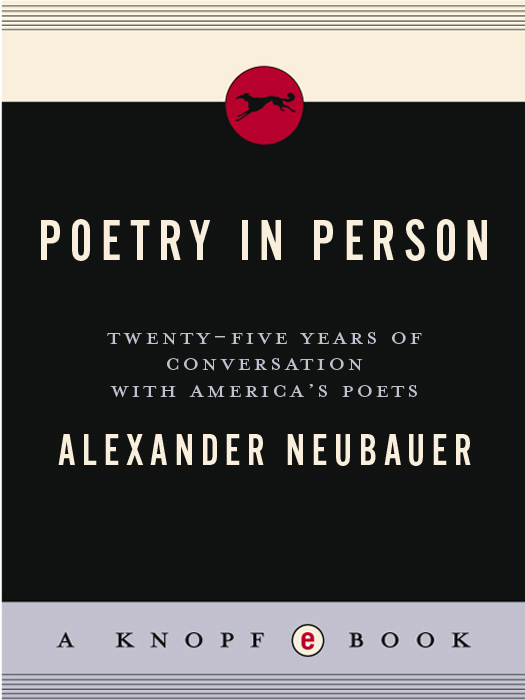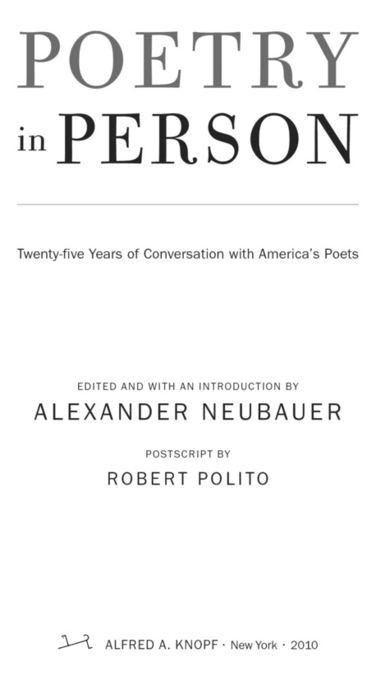ALSO BY ALEXANDER NEUBAUER
NONFICTION
Natures Thumbprint: The New Genetics of Personality
(with Peter B. Neubauer, M.D.)
AS EDITOR
Conversations on Writing Fiction: Interviews with Thirteen
Distinguished Teachers of Fiction Writing in America
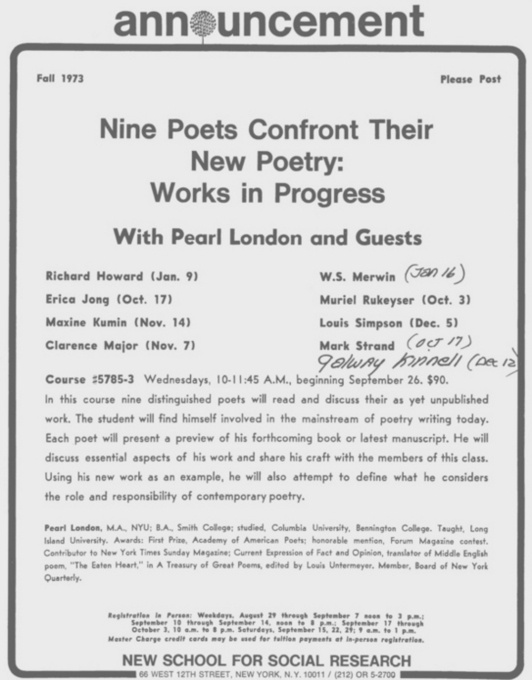
THIS IS A BORZOI BOOK
Published by Alfred A. Knopf
Copyright (c) 2010 by Alexander Neubauer
Postscript copyright (c) 2010 by Robert Polito
All rights reserved. Published in the United States
by Alfred A. Knopf, a division of Random House, Inc.,
New York, and in Canada by Random House of
Canada Limited, Toronto.
www.aaknopf.com
Knopf, Borzoi Books, and the colophon are registered
trademarks of Random House, Inc.
All permissions to reprint previously published
material may be found immediately following the
index.
Library of Congress Cataloging-in-Publication Data
Poetry in person: 25 years of conversation with
Americas poets / edited by Alexander
Neubauer.1st ed.
p. cm.
eISBN: 978-0-307-77246-6
1. American poetry21st century.
2. Poets, American20th centuryInterviews.
3. Poets, American21st centuryInterviews.
4. PoetryAuthorship. 5. Poetics.
I. Neubauer, Alexander.
PS617.P64 2010
811.608dc22 2009029277
v3.1
To Sam and Willa and April,
who write my favorite poems
every day
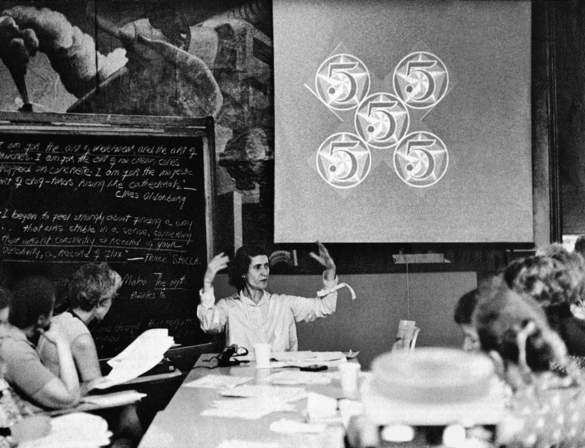
It follows that poems are not so important as the poetic process, the transforming power that spiritualizes the world, turning visibility into invisibility, the world into ourselves.
DENIS DONOGHUE
on The Selected Poetry of Rainer Maria Rilke
Contents
CONVERSATIONS
Maxine Kumin NOVEMBER 14, 1973
For My Son on the Highways of His Mind, Sperm
Robert Hass DECEMBER 14, 1977
Meditation at Lagunitas
Muriel Rukeyser FEBRUARY 22, 1978
Dream Drumming
Philip Levine MARCH 29, 1978
You Can Have It
Louise Glck FEBRUARY 28, 1979
For My Mother, Autumnal, World Breaking Apart
June Jordan MARCH 21, 1979
Poem for South African Women
James Merrill MAY 23, 1979
Mirabell: Books of Number
Marilyn Hacker APRIL 15, 1980
The Hang-Gliders Daughter
Galway Kinnell MARCH 24, 1981
Little Sleeps-Head Sprouting Hair in the Moonlight
Derek Walcott MAY 5, 1982
XLVIII
Amy Clampitt FEBRUARY 22, 1983
Black Buttercups
Lucille Clifton MAY 3, 1983
chemotherapy
Stanley Plumly april 29, 1986
Against Starlings
C. K. Williams MARCH 1, 1988
Medusa
Molly Peacock APRIL 7, 1992
The Hunt
Robert Pinsky NOVEMBER 16, 1993
The Want Bone
Edward Hirsch OCTOBER 2, 1993
Wild Gratitude
Frank Bidart MARCH 1, 1994
Confessional
William Matthews MARCH 29, 1994
My Fathers Body
Paul Muldoon MARCH 14, 1995
Cows
Li-Young Lee MARCH 29, 1995
The Cleaving
Charles Simic APRIL 19, 1995
Official Inquiry Among the Grains of Sand
Eamon Grennan MARCH 15, 1996
Ants
Introduction
IN THE FALL OF 1970, at the New School in Greenwich Village, a new teacher posted a flyer on the wall. It read Meet Poets and Poetry, with Pearl London and Guests. Few students responded. No one knew Pearl London. But the seminars first guests turned out to be John Ashbery, Adrienne Rich, and Robert Creeley. Soon Maxine Kumin followed, then W. S. Merwin, Mark Strand, and Galway Kinnell. So London upped the ante: She began asking all poets to deliver nothing less than the manuscripts of their newest poems for discussion.
If you can come, she wrote each of them, I would appreciate you sending me any notes jotted down on the back of an envelope, or work sheets of any sort, even doodles. This is a course concerned essentially with the making of the poem, with the work in progress as processwith both the vision and the revision. In a sense, the shaping spirit of the imagination is what it is all about.
Poets accepted one after another, word spread, and for the next twenty-five years Londons classroom became know simply as Works in Progress, a coveted destination for Nobel laureates Walcott and Heaney, a string of eight U.S. poet laureates, double National Book Award winner Merrill, and eleven Pulitzer Prize winners. There were poets at the height of their careersRukeyser, Simic, Clampitt, and Olds for instanceand poets at the cusp of their emergence in letters, like Carson and Muldoon. They came to Londons door as she requested, with fresh manuscripts and sheaves of notes and drafts in hand, under-the-hood evidence of exactly the vision and the revision that provoked her attention.
Maybe for the poets it seemed almost natural at the time, to finish or nearly finish a poem and share stages of the process with a small class of would-be poets and a dedicated teacher. But for us, in retrospect, the sheer accumulation of key names and important poems casts this seemingly quiet enterprise in a different light. Some of the poems they shared with Londons class would later be widely anthologized; many would turn out to be central pieces in the poets careersfor instance, the title poems to Pinskys The Want Bone and Hirschs Wild Gratitude, Clampitts Black Buttercups, a section of Merrills epic The Changing Light at Sandover, and Hasss essential Meditation at Lagunitas.
What did the poets get in return? They got examined, dissected, valued, and exposed. And nearly everyone came back for moresome two or three times, Plumly a record five. Within four walls for an hour and a half every other week, London quietly brought a generation to light, the best poets and poetry of the last quarter of the twentieth century.
THIS STORY might have been lost or little known following Londons death in 2003as classroom magic always fades, except briefly in memoryif not for the discovery of a hundred tapes hidden in boxes in a closet at her home in Manhattan, near Washington Square Park. The tapes represent most of the sessions recorded through 1998, when she retired. That the trove existed, secreted away for so long, stunned most everyone who knew about this seminar. It made sense that a few recordings would survive and resurface, since an old-fashioned cassette player sat on a desk during class, manned by one student or another. No one paid particular attention to it, however. No one ever expected to see the tapes together again, certainly not a complete catalog of them side by side. Yet there they were, along with file upon file stuffed with copies of the manuscripts and drafts the poets brought along on the days they visited.
I KNEW about Pearl Londons class, though not about the tapes or files. For five years in the mid-1990s I taught fiction writing at the New School, and if there was an empty chair and my schedule allowed, I dropped in to listen. Forch, Pinsky, Kunitz, Plumly, Hirschthese were like no interviews Id ever heard. Its a mistake to call them interviews at all, of course. With London in charge, as first-time guests learned soon enough, the interview model just broke down. These were conversations: passionate, human, sometimes formal or funny, tilting now and then toward improvisational theater. How did their new work reflect each poets central concerns? Were they after form or meaning, rhythm or rhyme, lyric or narrative, protest or confession? London kept looking for the heart, the essential metaphor of their work, and often enough she found it.


